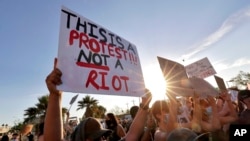Around the corner from where Anna Shchetinina lives in Minneapolis, the post office is gone, shops have been boarded up, and the police station has gone up in flames.
That’s the same police station the officers, who arrested and restrained George Floyd on a busy street before he died, worked from. Since then, protests and looting have erupted nationwide against racism -- Floyd was African American -- and police brutality in the U.S.
“These past few days demonstrated how physically vulnerable I am,” said Shchetinina, 29, an international student from Russia at the University of Minnesota. “Living in the center of the protest in Minneapolis put me in constant fear.”
Grocery stores, local restaurants, a couple of nonprofits, affordable housing sites affordable, bus stops, rose bushes and hydrangeas, are all gone, she said.
“Watching an apartment building next door burning with people trapped on the roof is scary. Smoke getting into your lungs making it impossible to breathe or see is terrifying.”
But Shchetinina says she harbors no anger toward whoever caused the damage and make her scurry from her house every night in a hurry.
“This wave is as much scary and damaging, as it is powerful and justified,” she said.
“I saw business owners saying: ‘Let my building burn if it’s for this cause.’ I saw people peacefully helping each other at the support centers. I saw as many people volunteering during daytime, as rioting at night, and most likely these two groups overlap.”
“I guess the only thing I haven’t seen these days is indifference. While Minneapolis is licking its wounds, the scars will remain as a sign of urgency of change,” she said.
Many young people are expressing sorrow and anger, compassion and anxiety over Floyd’s death, which instigated protests and rioting across the U.S.
“I worked very hard for years to learn English and earn all the qualifications to become a student here,” said Armenian native Ani Martikyan, 19. “I think that was one of the best decisions and achievements I've had in my life.”
But the unrest over racial discrimination unsettles her.
“I love the U.S. and what it offers me, but I am very disappointed by how my idea of it turned from a land that welcomes absolutely everyone to a place where people can get killed because of the color of their skin,” said Martikyan, a rising sophomore at Stetson University in Central Florida.
Like other international students in the U.S., Martikyan is stunned by the events leading to Floyd’s death. Although she knows many people from her country want to move here, she said “modern racism scares them.”
Martikyan said her mom in Yerevan is “worried” about her amid the upheaval. Armenia saw police brutality in 2015 when people protested hikes in electricity fees, and in 2018, during the Velvet Revolution against the government led by Nikol Pashinyan, who became the prime minister. But not since, she said.
“My mom is definitely very worried about me,” she said.
“Every time I see a video of a usual arrest in the U.S., [it] always seems unnecessarily violent and scary to me.”
Protests that began in Minneapolis -- where Floyd died May 25 after he was arrested and restrained on a busy street as bystanders video recorded the incident -- have spread to New York City, Dallas, and dozens of other U.S. cities. In Washington, protesters have clashed with law enforcement outside the gates of the White House.
“Me, personally, I believe every protest, every riot, tweet, post, hashtag, etc. is necessary,” said Raequan Johnson, an American computer-science student at the College of Southern Maryland.
“Everything is necessary for the change of this country. Everything in stores can be replaced but lives can’t be,” Raequan said. “These riots and protests are beneficial to get our point across. This probably isn’t going to end racial profiling but I’m confident that it will lessen it.”
Myanmar native Saw, 19, who used only one name because she fears her visa being revoked if she comments on the record, said recent events have “changed my mind about the police and how they are supposed to behave.”
Saw said that before choosing to pursue a biology degree in the U.S., she considered gun violence, but it had always been “her [dream] to study abroad [...] in the U.S.”
Family and friends from Myanmar were “shocked” seeing the police brutality in the U.S. last week, she said.
Jacob Mwanza, 36, an international student and graduate assistant at the University of Nevada-Reno from Zambia, said he has not personally felt racism.
But the Floyd video “brings a lot of untold fear in me because I am slowly realizing that these things are happening, and anyone can be a subject of racism,” Mwanza said.
“I am traumatized, really, my movements are restricted now, and I watch my back more than I used to. It is an experience that will live with me for a long time and will definitely influence my interactions/perceptions of life in the diaspora for an African child,” he said.
Some students, like Marcus Tarjamo, 26, said racism and police brutality in the U.S. will require a “multigenerational effort” to make progress.
“There’s a lot of work to be done,” the College of Southern Maryland student said. “This is not going to be something that can be solved within just 2020, 2021. This is going to be a … multiyear, and really I mean, multigenerational effort that we’re going to have to go and make to fix a lot of the problems in America.”
Ariel Hall, Ruby Rosenthal and Sarmat Misikov contributed to this report.




